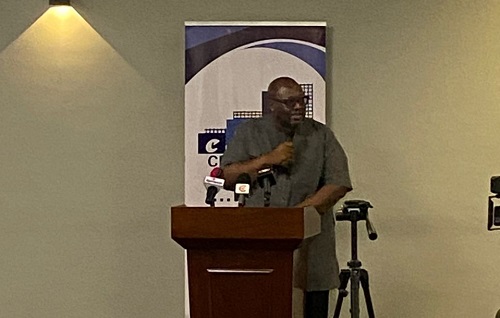Some Ghanaians have called for either the abolition or drastic reform of the Council of State, citing its limited influence on governance and a lack of transparency in its composition.
This was one of the key findings in a recent nationwide research project conducted by the Ghana Centre for Democratic Development (CDD-Ghana), presented in Accra on Thursday by the Centre’s Director of Policy Engagement and Partnerships, Dr Kojo Asante.
According to the research, respondents questioned the relevance of the Council of State, describing its advisory role as ineffective and its influence on executive decisions as marginal. Many participants expressed concern that the Council often functions as a rubber stamp rather than an independent check on presidential authority.
Critics also raised issues with the selection process, accusing it of being opaque and overly influenced by partisan interests. As a result, many participants proposed either abolishing the body altogether or restructuring it to give it more authority and ensure appointments are based on merit. “If the Council of State must be retained, then it should go beyond a purely advisory role and have more power to influence governance meaningfully,” Dr Asante stated during the presentation.
The findings stem from a wide-ranging research project titled “Citizens’ Expectations of Government: Insight from Post-Election Town Hall Forums,” conducted between 25 February and 20 March 2025.
Supported by the UK’s Foreign, Commonwealth and Development Office (FCDO), the project included 14 town hall meetings in 12 regions across Ghana and gathered views from 1,331 participants. Among them were 434 youth aged 15 to 35, 443 adults aged 36 to 59, and 109 elderly individuals aged 60 and above. The study also included 132 people with disabilities, with an overall gender split of 763 males and 568 females.
In addition to constitutional reform, the research addressed key themes such as local government, corruption, illegal mining, education, youth development, and public sector efficiency. On local government, the report called for the election of Metropolitan, Municipal and District Chief Executives (MMDCEs) to coincide with general elections to reduce costs and boost turnout.
It also recommended non-partisan elections and pilot projects to test feasibility before nationwide rollout. Participants advocated for proportional representation in district assemblies to ensure inclusivity for women, youth, and marginalised groups.
On the matter of executive dominance, the report urged government to abolish the practice of appointing Members of Parliament as ministers. “This would strengthen the separation of powers, improve parliamentary oversight, and enhance ministerial performance,” the report noted.
The study also addressed Ghana’s fight against corruption, recommending a stronger focus on enforcement and asset recovery, as well as enhanced citizen reporting mechanisms. Participants also called for amendments to presidential immunity provisions to allow for prosecution in corruption cases.
Illegal mining, or ‘galamsey’, drew sharp condemnation across the regions. Many respondents demanded a national ban or the declaration of a state of emergency in affected areas. They also called for the immediate reclamation of degraded lands.
On education, the report highlighted poor infrastructure and limited learning materials at the basic level as serious barriers to academic achievement. While participants recognised the benefits of the Free SHS policy, they raised concerns about the quality of implementation and called for increased investment in basic education. “Weak foundations at the basic level lead to poor literacy outcomes and limit success at the secondary and tertiary levels,” the report observed.
The research concluded by urging policymakers to take the views of citizens seriously as part of efforts to strengthen democracy and improve public service delivery. Dr Asante noted that the findings would be submitted to relevant state institutions, including the Constitutional Review Committee, as a contribution to ongoing governance reforms.

